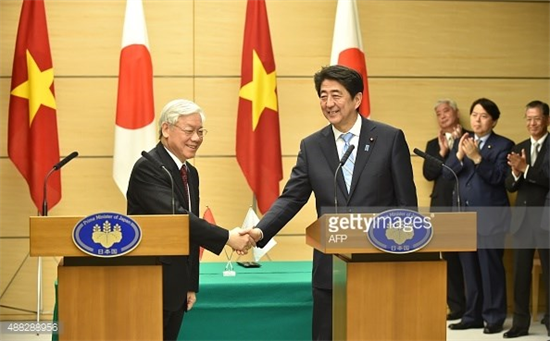 |
Party General Secretary Nguyen Phu Trong and Japanese Prime Minister
Shinzo Abe (Photo: VNA) |
Party General Secretary Nguyen Phu Trong has reassured Japanese Prime Minister Shinzo Abe that Vietnam considers Japan a leading and long-term partner and Vietnam’s firm foreign policy stance is a reflection of that.
The Party chief began his four-day official visit to Japan on September 15.
During their talks in Tokyo the same day, both sides agreed on initiatives to foster the Vietnam-Japan extensive strategic partnership with a focus on strengthening political trust, economic connectivity and cooperation, and stronger mutual support in regional and global issues.
The two leaders vowed to facilitate regular visits and exchanges between senior leaders, legislatures and political parties as well as extend existing dialogue mechanisms.
Both countries will promote sustainable linkages between their two economies over the long-term in fields of potential and supplementary support with a focus on connecting economic development strategies, production and human resources.
Speaking highly of Japan’s support to Vietnam during the reform period over the past 20 years, the Party chief asked for Japan’s continued provision of official development assistance for Vietnam.
Vietnam wants to be given priority to realise Japan’s high-quality infrastructure aid initiative, business climate improvement and technology transfer, and hopes that Japan will funnel more capital into Vietnam in agriculture, the support industry, mechanical engineering and the construction of large-scale industrial parks, including ones used exclusively for particular industries, he said.
He also asked Japan to help Vietnam improve its farm produce value chain, making it easier for Vietnam’s farm produce, wooden furniture and fisheries to navigate the Japanese market along with human resources development and receiving more Vietnamese nurses and trainees.
Responding positively to the guest’s proposals, Abe confirmed that Japan will continue supporting Vietnam in sustainable economic development, including prioritising ODA to Vietnam.
He announced that Japan will provide roughly 100 billion JPY for Vietnam’s north-south highway and ports in the foreseeable future.
On infrastructure, the host wished to work jointly with Vietnam to build the Long Thanh international airport, Ninh Thuan 2 nuclear power plant and specialised industrial parks in Hai Phong and Ba Ria-Vung Tau.
Collaboration in human resources training for Vietnam will also be strengthened in the future.
Host and guest concurred to effectively realise the Mid and Long-term Joint Vision on Agricultural Cooperation, opening Vietnam’s market for Japanese apples as well as Japan’s market for Vietnamese mangos from September 17.
They agreed to facilitate travel for the two people, with Abe announcing Japan’s decision to extend visas for Vietnamese businesspeople up to 10 years.
In regards to defence exchanges at all levels, Abe voiced his willingness to work with Vietnam to improve its maritime law enforcement capability.
The Japanese government is set to provide second-hand vessels for Vietnam and assist the country in the United Nations peacekeeping mission.
Vietnam and Japan will also intensify coordination in dealing with traditional and non-traditional security threats.
Turning to regional and global issues, Abe briefed his guest about Japan’s position on several historical issues and policies towards regional peace and security.
The Vietnamese guest restated his nation’s commitment to pursuing peaceful development and backing Japan’s constructive contributions to peace, security, cooperation and development in the region and beyond.
The leaders promised to liaise closely at ASEAN and East Asia summits and other multilateral forums, as well as on the negotiations for and execution of regional free trade agreements, including the Trans-Pacific Partnership and the Regional Comprehensive Economic Partnership.
Abe welcomed Vietnam’s tentative bid for membership of the International Whaling Commission as well as official membership of the Western and Central Pacific Fisheries Commission.
He also committed to supporting Vietnam in hosting the 2017 Asia-Pacific Economic Cooperation forum.
Expressing concern over recent complicated developments in the East Sea, they underscored the need to abide by international law, especially the 1982 United Nations Convention on the Law of the Sea and the Declaration on the Conduct of Parties in the East Sea, towards the formulation of a Code of Conduct in the East Sea.
The same day, the Party chief and Prime Minister Abe witnessed the signing of six cooperation agreements between the two countries.
Following the signing ceremony, they convened a press conference and announced the outcomes of their talks.
On the evening of the same day, Abe hosted a banquet for the Vietnamese delegation at his official residence in Tokyo.
Source: vietnam+